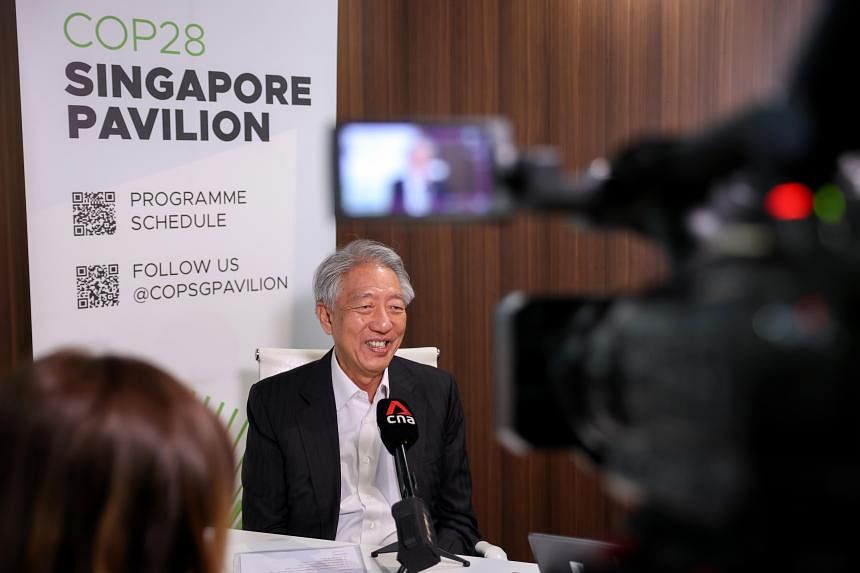DUBAI – Any change to Singapore’s carbon tax rate will happen after the Government takes into account the cost of carbon, the negative impacts of emitting the planet-warming gas into the atmosphere, and the alignment with international developments, Senior Minister Teo Chee Hean said on Dec 5.
His comments come after the Monetary Authority of Singapore’s outgoing managing director Ravi Menon said on Dec 4 that he hopes for the carbon tax to go even higher to accelerate climate action and address global warming.
Singapore’s carbon tax is currently set at $5 per tonne of emissions, but will increase to $25 per tonne from 2024, and to $45 per tonne between 2026 and 2027. The tax will eventually be set at between $50 and $80 per tonne by 2030.
Speaking to reporters at the end of his four-day visit to Dubai for the United Nations’ COP28 climate conference, Mr Teo said the Government will look into how different countries make policies, which take into account both price and non-price factors, to deal with the negative effects of emitting carbon dioxide.
Some countries, such as Switzerland and Sweden, have a carbon tax of at least €100 (S$145) per tonne of CO2.
As to how Singapore hopes to manage the cost of the energy transition, Mr Teo said the revenue from the carbon tax will be used to help households and businesses make a transition to a greener economy and greener living.
Mr Teo also gave a wrap-up of Singapore’s involvement in the global conference, including its participation in international negotiations and how it contributes to international collaboration.
“It is not just the negotiations taking place, but also how does one implement the things which have been previously agreed upon. So, Singapore has really been focusing on the energy transition, and we have a number of different initiatives on this,” said Mr Teo, who is also the Coordinating Minister on National Security.
The Republic has launched a number of climate finance initiatives to help countries in the region move away from coal-fired power plants and accelerate their adoption of renewable energy.
Notably, Singapore hopes to mobilise up to US$5 billion (S$6.7 billion) in blended finance to facilitate the energy transition – the Government is prepared to step in to finance projects in Asia that are deemed riskier, to get the private sector on board. Some examples include the scaling up of renewables and the modernising of the electricity grid.
Singapore has also signed a number of declarations, including the pledge to triple renewable energy capacity by 2030 and double the rate of global energy efficiency improvements, as well as the Global Cooling Pledge, which calls for countries to reduce, by 2050, their cooling-related emissions by at least 68 per cent compared with 2022 levels.
Emissions from refrigerants and the energy used in cooling account for about 7 per cent of climate-warming emissions, and energy demand for cooling could triple by 2050 as temperatures climb.
Asked about Singapore’s position on the contentious global debate to “phase down” or “phase out” fossil fuels, Mr Teo said Singapore supports the COP28 presidency in various initiatives.
“For us, we are an alternative-energy disadvantaged country, and we have tried to be as clean as possible. So, we gave up coal decades ago, we gave up using fuel oil two or three decades ago. We have been using natural gas.
“And in many countries, including Europe, they recognise natural gas as a transition fuel.
“In the long term, one can hope to see fossil fuels... either done away with, or used in a much more carbon-effective way. But that is something to be decided on by international negotiations. And so we (are a) part of those negotiations and see what will be (agreed upon),” he added.
COP28 president Sultan Al Jaber had claimed that there is “no science” that says a phase-out of fossil fuels is needed to limit global warming to 1.5 deg C, according to an article by the Guardian on Dec 3.
He added that a phase-out of fossil fuels would not allow sustainable development “unless you want to take the world back into caves”.
His comments drew the ire of scientists, who said that Dr Jaber was “verging on climate denial”.
Asked about his thoughts on Dr Jaber’s comments, Mr Teo said: “Well, I don’t want to get into this debate because we are not part of (it). The controversy that arose had nothing to do with us.”
The Senior Minister added that there is science behind climate change, with eminent scientists worldwide having come to this conclusion.
“And even if you don’t take reference from the science, (from) what people all over the world have been feeling every day, every year, I think it is quite apparent that something unusual is happening to the global climate. We see floods, we see torrential rain, we see droughts, we see fires, and to the extent that we have not seen before,” he said.
Mr Teo noted that the COP conferences have evolved from the early days – around the time of the Paris Agreement in 2015 – when the focus was on reaching an agreement on what needs to be done.
“Since 2015, the focus has shifted towards the implementation of what we said we will do. And we continue to play a part.”
For instance, Article 6 of the Paris Agreement, which relates to carbon markets, had been decided at COP26 in Glasgow in 2021, he added. In the past two years, it has shifted to creating high-integrity carbon markets after an agreement on what it would entail.
High-integrity carbon markets ensure that carbon projects bring about real emission reductions, and have socio-economic benefits to the wider community, among other things.
“So, it has moved from an in-principle agreement to, now, implementation and actual projects, and I see that as a trend at COP28, (which is) a positive thing,” Mr Teo said.


